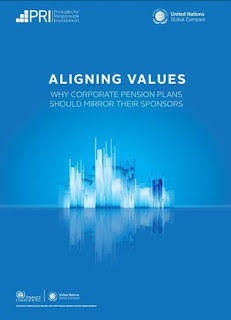Sustainability Leaders Issue Call-to-Action to CEOs
The PRI and the UN Global Compact call for more sustainability around Corporate Pensions
The leaders of the world's two largest corporate and investor sustainability initiatives today called on CEOs to ensure their corporate pension plans – an untapped sustainability area – adopt responsible investing policies – highlighting concrete benefits including improved investment performance, fulfilling fiduciary duty and managing regulatory risk and boosting corporate sponsor credibility.
According to a guide released today by the UN-supported Principles for Responsible Investment (PRI) and UN Global Compact, CEOs should ensure plans mirror their own sustainability values.
Aligning Values: Why corporate pension plans should mirror their sponsors includes case study examples from major corporate pension plans showing how companies have taken steps to make their plans sustainable. It also gives five steps a CEO could take to ensure their plan invests responsibly, such as signing up to the PRI.
The guide aims to mobilise an important investment sector that has remained largely dormant in terms of advances in sustainability practices. In the US alone private-sector Defined Benefit plans held USD $2.9 trillion assets at the end of 2016. The global industry is estimated at many trillions of dollars.
"While significant numbers of institutional investors and corporations are now integrating environmental, social and governance factors, corporate pension plans remain a sleeping giant", said Lise Kingo, Chief Executive Officer and Executive Director, UN Global Compact and Fiona Reynolds, Managing Director, PRI. "And when we consider the capital that will be needed to achieve the Sustainable Development Goals, the multi-trillion-dollar corporate pension industry needs to be activated to join other actors in private finance that have aligned to the 2030 Agenda".Kingo and Reynolds noted that of the 1,700-plus signatories to the PRI, less than 50 are corporate plans.
In an effort to address this imbalance, Kingo today called on the CEOs of corporate signatories of the UN Global Compact, in their role as sponsors, to encourage their associated corporate pension schemes to adopt the PRI principles, recognising that pension scheme decision making is independent of a plan's sponsor.
"We strongly believe that corporate plans need to align with their sponsors' sustainability philosophy", said Kingo, "otherwise, investment decisions will be out of step and could actually be undermining the stated aims of the sponsoring corporation's strategy".Reynolds added:
"The evidence and proof now abounds: adopting responsible investing practices is not only consistent with fiduciary duty, it unlocks financial and social capital over the long term. Failing to address ESG and sustainability factors poses material risks to any pension plan".About the Principles for Responsible Investment (PRI)
The PRI is the world's leading proponent of responsible investment. It works to understand the investment implications of environmental, social and governance (ESG) factors and to support its international network of investor signatories in incorporating these factors into their investment and ownership decisions. The PRI acts in the long-term interests of its signatories, of the financial markets and economies in which they operate and ultimately of the environment and society as a whole.
About the United Nations Global Compact
The United Nations Global Compact is a call to companies everywhere to align their operations and strategies with ten universally accepted principles in the areas of human rights, labour, environment and anti-corruption, and to take action in support of UN goals and issues embodied in the Sustainable Development Goals. The UN Global Compact is a leadership platform for the development, implementation and disclosure of responsible corporate practices. Launched in 2000, it is the largest corporate sustainability initiative in the world, with more than 9,000 companies and 3,000 non-business signatories based in over 160 countries, and more than 70 Local Networks.
- See more here




This comment has been removed by a blog administrator.
ReplyDelete